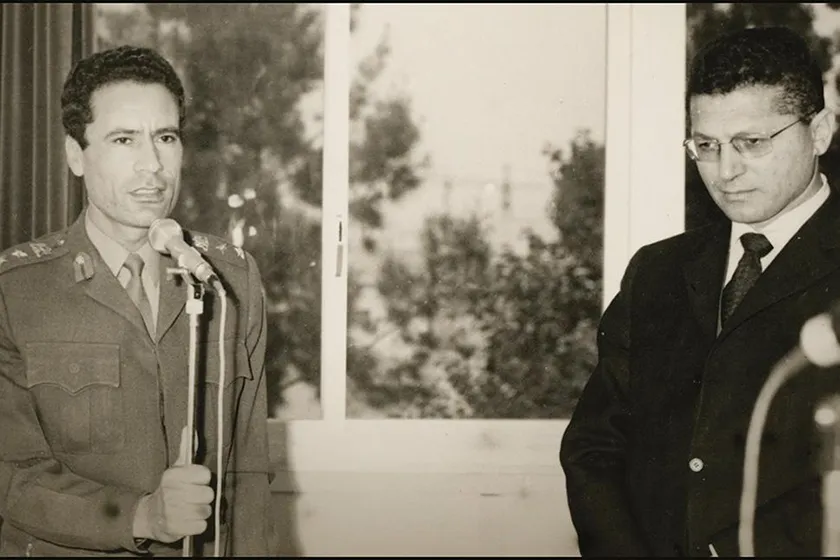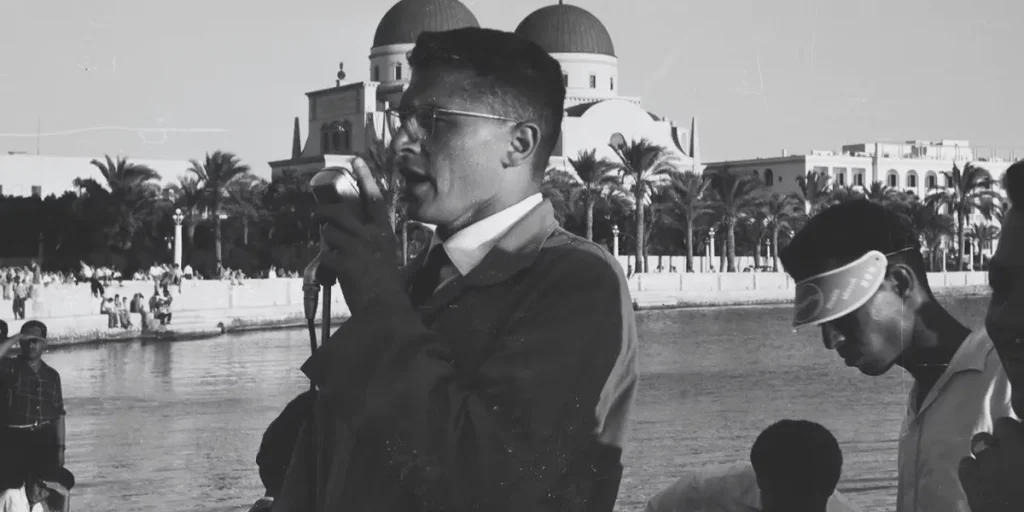Directed by the main character’s daughter, My Father and Qaddafi is a personal account of a historical tragedy.
Director: Jihan K
Original Title: بابا و القذافي
Genre: Documentary
Run Time: 88′
Venice World Premiere: August 29, 2025
U.S. Release Date: TBA
U.K. Release Date: TBA
As the title suggests, My Father and Qaddafi is a recollection of director Jihan K’s father’s relationship with the Lybian leader Quaddafi, and the Lybian government at large. In particular, she focuses on her family members’ relationship with her late father through talking head interviews. A lot of the film also analyses the day of his disappearance of Mansur Kikhia in 1993, when she was just 6 years old and the family’s fight to learn the truth about what happened that day.
My Father and Quaddafi is very good at relaying the historical events that tie in with Libya’s painful history. The movie explains all the historical context of the country necessary to understand the movie without overexplaining anything. At the same time, it is also easily understandable even for those of audience who might not be familiar with it. The documentary also touched on the Italian occupation of Lybia, which is often not shown or talked about as much in films or even contemporary political discussions at all.
“I don’t remember his voice. I don’t remember the way he cared for me. I struggle sometimes to believe my father was real.” This is part of the initial voiceover that starts My Father and Qaddafi. From the very beginning, it is clear that this is as much a film about Mansur and Qaddafi as it is about grief. Almost all the subjects interviewed in this documentary have a personal connection to Mansur, in fact most of them are family members. And the voice behind the camera – and sometimes in front of it – belongs to the director, Mansur’s own daughter who offers a very emotional and vulnerable outlook on her father’s disappearance.

“I still rely on other people’s memories,” says Jihan when she introduces her father. And this is very much what My Father and Qaddafi wants to be: an attempt from the director to get to know her father through the memories of her family members. Interview by interview, she creates the image of a man she never really knew. In many ways, this feels like something she needed to do to come to terms with her father’s murder. The personal point of view makes the documentary stand out and it easily the film’s strongest suit. This is not just an account of what happened to Mansur, but rather a tribute to who he was as a man, a husband, a father, and a politician.
The voiceover is very refreshing to hear as it steps away from the tried and tested formula of the voice of God narration that we see in documentary filmmaking. Instead, My Father and Qaddafi employs a first-hand personal account in its voiceover. Through the film, Jihan K balances her personal quest to remember her father with retelling the tragedy that happened to him. This is ambitious and does not always work well. At times, it almost feels like watching two movies. One is a portrayal of who Mansur was through the words of his friends and family and the other one concerns the history of his disappearance and murder.
My Father and Qaddafi is very personal, perhaps too much for the audience who does not have a personal connection to any of the people mentioned in it. Naturally, this was bound to happen given that the director is talking about her personal story, but it does feel like there is not enough distance between the filmmaker and her chosen subject matter. The events are too fresh in her memory and perhaps even too painful for her – or many of the people involved – to be able to look at this objectively, as a product for an external audience rather than for people who were directly involved with the events narrated.
Not without its faults, My Father and Qaddafi is still an interesting documentary that offers a fascinating viewpoint on a historical matter. Its emotional resonance is both a positive and a negative. On one hand, it makes the documentary unique and allows the audience to get to know this historical tragedy on a personal and private level. But on the other, it does lose a level of objectivity that the audience might want and expect from a documentary film.
My Father and Qaddafi: Movie Plot & Recap
Synopsis:
Mansur Kikhia was a prominent figure in Libyan politics and a human rights lawyer who mysteriously disappeared in 1993 when his daughter, the director of the documentary, was only six years old.
Pros:
- The historical elements are explained very clearly.
- The pain and grief of the family are heartbreaking to see and portrayed well.
Cons:
- The personal and historical elements do not always mix well.
- The documentary reads more like a personal diary than a product for an external audience.
My Father and Qaddafi had its World Premiere at the Venice Film Festival on August 29, 2025.

